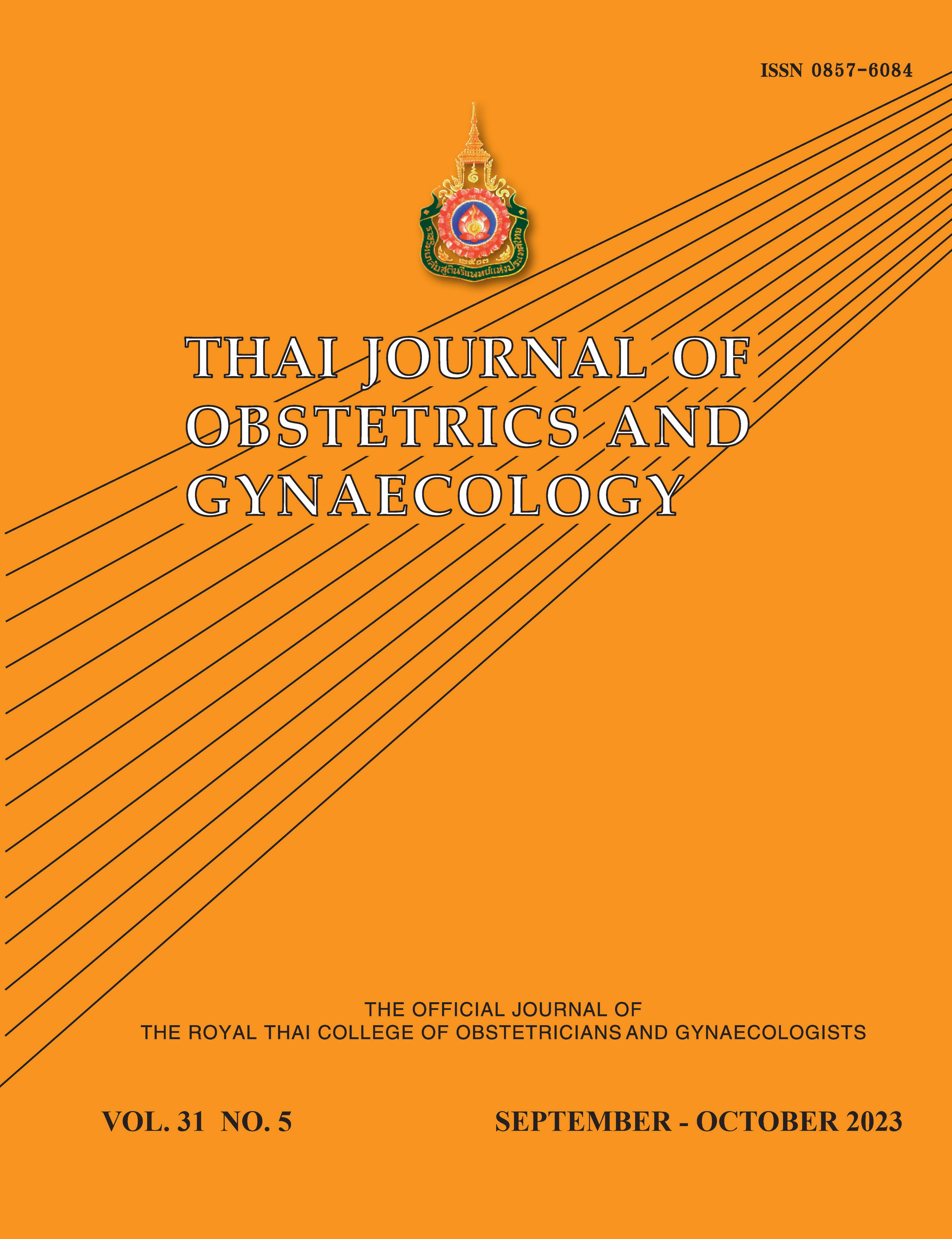Changes of Ovarian Reserve after Hysterectomy for Non-oncologic Conditions in Reproductive-aged Women: A prospective study
Main Article Content
Abstract
Objectives: To assess the impact of hysterectomy on the ovarian reserve markers in reproductive-aged women.
Materials and Methods: This prospective cohort study was conducted from May 2021 to April 2022. Reproductive-aged women who underwent hysterectomy without ovarian surgery due to benign conditions at Rajavithi Hospital were recruited. Ovarian reserve markers were compared between the date before surgery and 12 weeks following hysterectomy by measurement of serum anti-Müllerian hormone (AMH), antral follicle count (AFC) and ovarian volume (OV).
Results: Fifty-five reproductive-aged women were enrolled. Different proportion (DP) between serum AMH at preoperative and 12 weeks postoperative was decreased after hysterectomy (DP 22.5%, p = 0.001). The antral follicle count (AFC) and ovarian volume (OV) were also decreased (DP 33.3%, p < 0.001, and 20.0%, p < 0.001, respectively). Nonetheless, surgical outcomes and menopausal symptoms were not different.
Conclusion: Hysterectomy without ovarian surgery affects the ovarian reserve at 12 weeks post operation without significantly changing of menopausal symptoms. However, other long-term consequences from accelerated ovarian aging should be investigated.
Article Details

This work is licensed under a Creative Commons Attribution-NonCommercial-NoDerivatives 4.0 International License.
References
Sievert LL, Murphy L, Morrison LA, Reza AM, Brown DE. Age at menopause and determinants of hysterectomy and menopause in a multi-ethnic community: the Hilo Women’s Health Study. Maturitas 2013;76:334-41.
Committee Opinion No 701: Choosing the route of hysterectomy for benign disease. Obstet Gynecol 2017;129:e155-e9.
Moorman PG, Myers ER, Schildkraut JM, Iversen ES, Wang F, Warren N. Effect of hysterectomy with ovarian preservation on ovarian function. Obstet Gynecol 2011;118:1271-9.
Chun S, Ji YI. Effect of hysterectomy on ovarian reserve in the early postoperative period based on the type of surgery. J Menopausal Med 2020;26:159-64.
Dalal PK, Agarwal M. Postmenopausal syndrome. Indian J Psychiatry 2015;57:S222-32.
Hadlow N, Brown SJ, Habib A, Wardrop R, Joseph J, Gillett M, et al. Quantifying the intraindividual variation of antimullerian hormone in the ovarian cycle. Fertil Steril 2016;106:1230-7.
Deb S, Campbell BK, Clewes JS, Pincott-Allen C, Raine-Fenning NJ. Intracycle variation in number of antral follicles stratified by size and in endocrine markers of ovarian reserve in women with normal ovulatory menstrual cycles. Ultrasound Obstet Gynecol 2013;41:216-22.
Wang HY, Quan S, Zhang RL, Ye HY, Bi YL, Jiang ZM, et al. Comparison of serum anti-Mullerian hormone levels following hysterectomy and myomectomy for benign gynaecological conditions. Eur J Obstet Gynecol Reprod Biol 2013;171:368-71.
Singha A, Saha S, Bhattacharjee R, Mondal S, Choudhuri S, Biswas D, et al. Deterioraron of ovarian function after total abdominal hysterectomy with preservaron of ovaries. Endocr Pract 2016;22:1387-92.
Wunder DM, Bersinger NA, Yared M, Kretschmer R, Birkhauser MH. Statistically significant changes of antimullerian hormone and inhibin levels during the physiologic menstrual cycle in reproductive age women. Fertil Steril 2008;89:927-33.
Cho HY, Park ST, Kyung MS, Park SH. Assessment of ovarian reserve after hysterectomy: laparoscopic vs. non-laparoscopic surgery. Eur J Obstet Gynecol Reprod Biol 2017;210:54-7.
Oldfield AL, Kazemi M, Lujan ME. Impact of obesity on anti-mullerian hormone (AMH) levels in women of reproductive age. J Clin Med 2021;10:3192
Wang S, Gu J. The effect of prophylactic bilateral salpingectomy on ovarian reserve in patients who underwent laparoscopic hysterectomy. J Ovarian Res 2021;14:86.
NamGoung S, Chang Y, Kim Y, Kim H, Cho IY, Kwon R, et al. Low anti-Mullerian hormone levels are associated with an increased risk of incident early-onset vasomotor symptoms among premenopausal women. Sci Rep 2022;12:11904.


